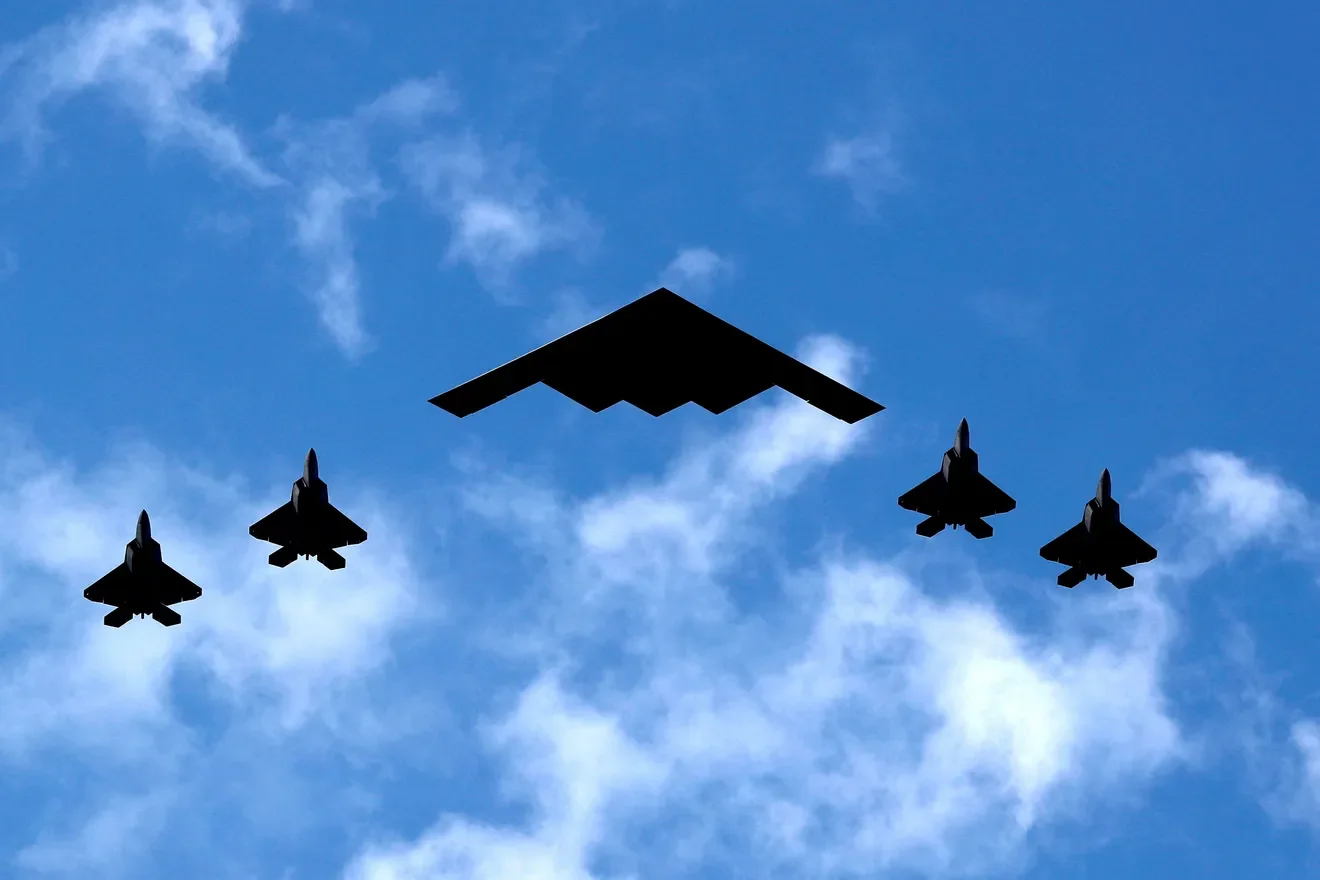Intervention for Me, But Not for Thee
Intervention for Me, But Not for Thee
The reaction to Trump’s strike on Iran is symptomatic of a deeper problem.
(A B-2 bomber is escorted by four F-22s. | SOURCE: Mike Segar / Reuters)
Partisan showmanship threatens to harm America’s ability to defend itself. The political left’s reaction to President Trump striking Iran’s nuclear facilities is the latest example of the willingness of many in Washington to play political games with America’s national security.
It seems like when one’s party is in power, intervention is in fashion. But when the White House flips, the other party is suddenly warmongers. Not only do critics of the strikes appear hypocritical, but the constitutional and strategic objections to Trump’s strikes were and are unconvincing.
Opponents of the strikes legally employ tortured logic to distance them from direct antecedents and ignore the regulations governing the administration’s actions. Those strategically opposed to the strikes woefully underestimate the threat posed by the Iranian regime acquiring nuclear weapons.
The last few years are replete with examples of both parties prioritizing cheap talking points over national security. Biden and Congressional Democrats spent years taking a hardline stance against Russian President Vladimir Putin, while supporting Israel’s war in Gaza, striking the Houthis, and making threats of force against Chinese President Xi’s expansionist plans. In the 2024 election, Trump capitalized on this hawkishness to significant effect. Even as many Americans still see the Democrats as the party of war, they have hypocritically attempted to pivot when President Trump takes offensive operations (operations that Biden would have likely approved as well).
Republicans are also no strangers to this kind of flip-flopping, and President Trump is the most serious offender. According to him, there is no possible explanation for any conflict over the last four years other than Biden’s incompetence. When Biden sent a few thousand reservists to Europe, it was “reckless.”
But when Trump repositions two nuclear submarines in response to taunts on social media from former Russian President Dmitry Medvedev, he deems it appropriate. From siding with Russia against Ukraine at the UN, only to revert to condemning the Putin regime, the president’s first two hundred days in office have been full of contradictions, ones that he would relentlessly mock anyone else for.
The first main objection made by many Democrats against Trump’s Iranian strikes is that it was unconstitutional. The Constitution contains two relevant clauses. First, Congress has the power to declare war. Second, the President is the Commander-in-Chief of all armed forces. Many on the left argue that Trump’s strike was illegal because he did not ask for authorization from Congress.
The issue becomes far more complicated when one asks what constitutes war. The United States has only formally declared war through a vote of Congress on five occasions. Yet it has engaged in far more conflicts, which are colloquially referred to as wars. Many of these conflicts had Congressional approval without a formal declaration of war (of which the Korean and Vietnam Wars are prime examples).
But the question remains, what is war? Is war when two nations exchange mutual, formal declarations? That would exclude the aforementioned East Asian conflicts. Is it war when one nation attempts to occupy another? But that would exclude most forms of naval and air warfare. Must the President consult Congress before conducting any airstrike? To respond to a nuclear first strike? The United States could not have been going to war every time it conducted a drone strike in the past twenty years.
These are the sort of uncomfortable questions one encounters when trying to haphazardly classify a political opponent’s action as war without examining historical precedent.
In 1861, before a formal declaration of war from Congress, President Abraham Lincoln authorized the Anaconda Plan, which involved a naval blockade of the Confederacy and the seizure of numerous commercial vessels. In the 1863 Prize Cases, the Supreme Court upheld President Lincoln’s actions, stating, “if a war be made by invasion of a foreign nation, the President is not only authorized but bound to resist by force.” While the situation is disanalogous in many respects to Trump’s actions, it illustrates that the Supreme Court has held for 150 years that there are some actions of war that the President can execute without congressional approval.
The Court has stayed silent on the validity of various presidential interventions since, despite unilateral defensive and offensive operations in Korea, Panama, Kosovo, Libya, and far more. Of the handful of attempts Congress has made to rein in some of its authority, the War Powers Act of 1973 is the most significant. In it, the president must notify Congress within 48 hours of placing troops on the ground, after which a 60-day grace period ensues during which the president must either cease all actions or request a formal authorization from Congress.
Citing this bill against Trump is silly. The B-2 bombers, which conducted the strikes, weren’t even in the air for 60 hours, let alone 60 days. To be exact, between the time of take-off and touchdown at their airbases in Missouri, 37 hours passed, under the 48-hour duration imposed by the act.
Trump then quickly informed Congress and the public at large. Democrats were well aware of these facts, which is why Senator Tim Kaine tried to file a resolution prohibiting Trump from striking Iran. Why would he feel the need to file an amendment if it was prohibited under the original Act?
Even so, there are other avenues by which the strike could be statutorily licit. Following 9/11, Congress passed the 2001 Authorization for Use of Military Force, allowing President George W. Bush to wage war against those responsible. The lack of a sunset clause has allowed the bill to be interpreted very broadly by Presidents Bush, Obama, and Trump.
Strikes against groups with no relation, such as ISIS, have been justified using the AUMF. While this is a legal stretch, the Trump administration could argue that Iran’s status as a state sponsor of terrorist organizations such as the Houthis and Hezbollah justified the strikes.
There are still other possible justifications. The president could claim that Iran violated international nuclear regulations. A similar casus belli was used by President Barack Obama against Libya, when he accused Gaddafi of violating various international conventions.
When holding Trump to the same standards as previous presidents, there is simply no logical path to call his strikes unconstitutional while justifying various other offensive campaigns. President Ronald Reagan’s intervention in Grenada, George H.W. Bush's in Panama, Bill Clinton's in Kosovo, Obama's in Libya, and numerous other offensive operations against sovereign nations have been undertaken without any congressional approval.
(U.S. Army UH-60 Black Hawk flying over Grenada during Operation Urgent Fury. | SOURCE: U.S. Department of Defense / Defense Media Network)
Given that a majority of Democratic lawmakers either come from a legal background or were members of Congress when presidents undertook similar interventions, it is unlikely the dramatic claims of unprecedented executive overreach are sincerely held beliefs. There’s a reason why Democrats have let such allegations be quietly forgotten over the months since the strikes.
The strategic and military objections also fall short. There has been a great deal of conflation in the media about Israel’s decision to first strike against Iran and the American bombings of the nuclear facilities. Whether Israel’s attack was justified is irrelevant to Trump’s decision. Prime Minister Benjamin Netanyahu made his decision unilaterally. President Trump had to accept the situation and adjust accordingly.
His decision was predicated on a very reasonable argument: a nation that mandates its children chant “Death to America” cannot be allowed to possess nuclear weapons. The Iranian regime has and will continue to see America as the “Great Satan.” After being bombarded for two weeks by a nation that America sends billions of dollars in arms to each year, what reason would Iran have for restraint in their nuclear program?
If any nation, let alone a fundamentalist Islamic one that routinely funds or carries out acts of violence, sees its conventional means of defense from bombardment by its enemy as useless, there is likely nothing to prevent it from desperately trying to acquire nuclear weapons. Israel forced Trump’s hand while negotiations were ongoing, which is insidious. But it does not make his decision to strike after the fact less reasonable.
President Trump’s decision to strike may have unforeseen consequences that cause the situation in the Middle East to spiral out of control. It already appears that a second conflict may be on the horizon. But brazenly slandering measured strikes as unconstitutional or moronic simply because Donald Trump happens to be the one doing them is not helpful.
Hyper-partisan rhetoric in response to reasonable military actions is not unprecedented, but it is incredibly worrying. Military action, no matter how necessary, becoming a strictly partisan issue, will endanger the ability of future administrations to take reasonable actions to defend America and our allies. Only time will tell if party leaders will choose fake talking points and misinformation if Russia invades the Baltics, or if China decides to test U.S. naval strength in the Taiwan Strait. I simply hope we do not need to find out.
The opinions expressed in this magazine are the authors’ own and do not reflect the official policy or position of The Spectator, or any students or other contributors associated with the magazine. It is the intention of The Spectator to promote student thought and civil discourse, and it is our hope to maintain that civility in all discussions.



